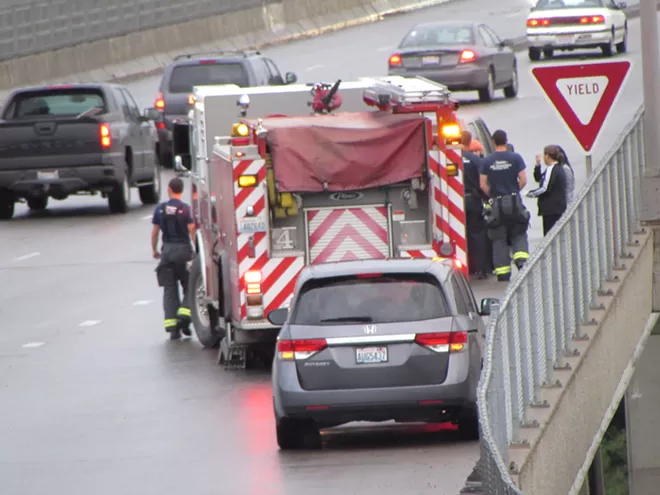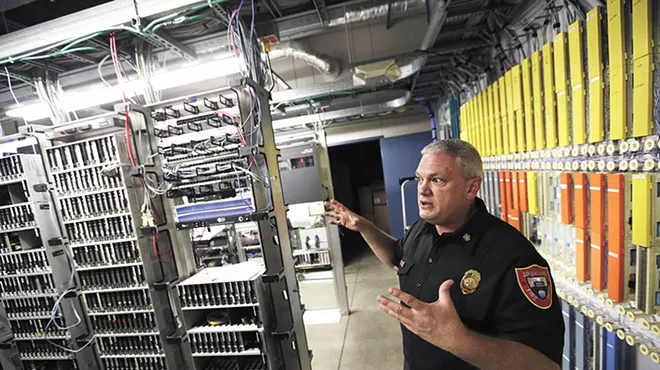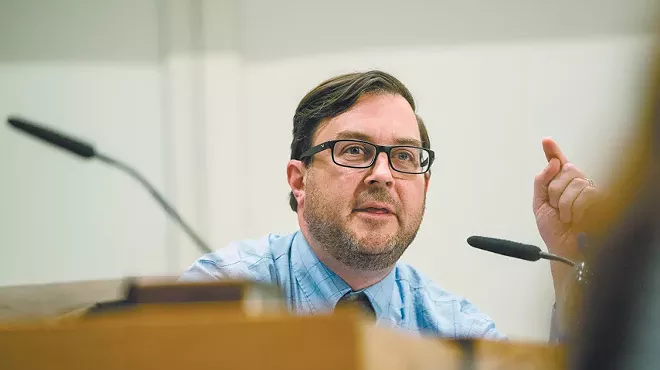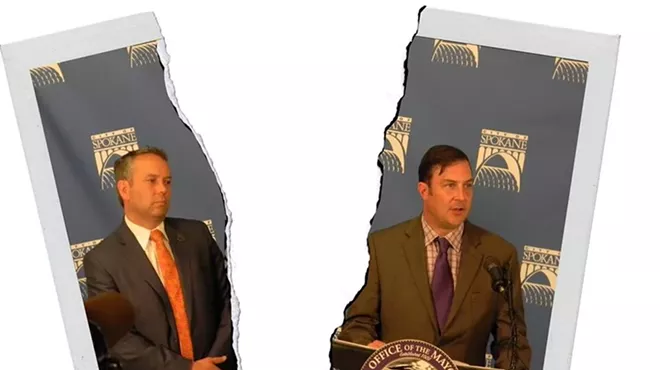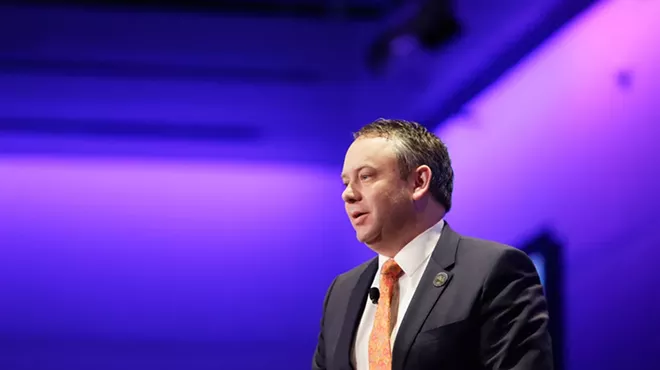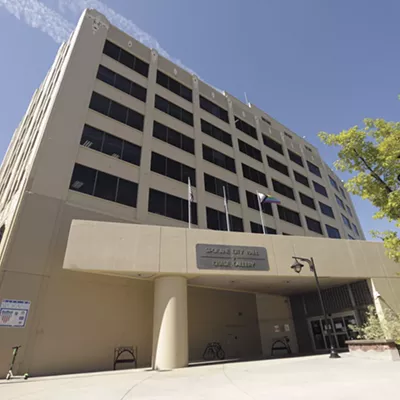Even as the rest of the county has planned to switch to the new integrated system, concerns from the City Council have remained constant: The council couldn't get clear answers on a number of crucial questions.
WE STILL DON'T KNOW HOW LONG 911 CALLS TAKE CURRENTLY
Even as a deadline looms this week for the City Council to make its decision, nobody has a clear answer to the most fundamental life-or-death question: How fast is Spokane's current dispatching system compared to the numerous already-integrated dispatch centers across the country?
That's because nobody has the answer to an even more basic question: On average, how long does it take from the moment you finish dialing 911 to the moment the Fire Department is alerted to your emergency?
"I don’t know," says Steve Reinke, SREC director. "Just honestly, we don’t know."
On one hand, it's one of the strongest arguments that skeptics have against integration: Why should Spokane ditch its current system if we don't even know that the current system is slower than other agencies?
But on the other hand, it's one of the strongest arguments in favor of integration. One of the big reasons why we don't know the basic question of how fast the dispatch system is because the system isn't integrated currently.
Right now, if you call about a house fire, your call is answered by 911 — handled by Spokane County's 911 agency — before being transferred to the fire dispatchers, controlled by the city of Spokane.
So Reinke says the county has the typical average of how long it takes for the 911 dispatchers to take down the information and then transfer the call over to the fire dispatchers — around 90 seconds on average. And the city has the time it takes for fire dispatchers to take the call from the 911 operators, take down more information and then send the call out to the Fire Department or ambulances — anywhere from 30-60 seconds on average.
So couldn't you just add the two averages together?
Nope, Reinke says. There's some overlap between the two figures. The fire dispatcher clock starts before the 911 dispatcher clock ends. As fire dispatcher Kelly Masjoan says, 911 and fire often remain on the call together, sharing details and providing update. Try to add the two figures together and you can get a wildly inflated number.
That means previous figures cited by local officials and reported in the Inlander were inaccurate.
Still, Reinke — who had years of experience under the Valley Com integrated dispatch system in Kent, Washington — says that he's certain switching to the integrated system would save valuable seconds. The current system has flaws, redundancies, technical problems and delays. No matter how fast the handoff is from one agency to another, Reinke says, there is a delay. Allow the whole thing to be handled by one dispatcher, he argues, and you'd have to save time.
"It’s virtually impossible for it not to be better as an integrated center," Reinke says.
In 2017, it took an average of a little over 92 seconds from the time Valley Com answered a fire/medical call in Kent until it was sent out by dispatch. In other words, by the time the average call is transferred from the 911 call receivers to the fire dispatchers in Spokane, Valley Com has already dispatched emergency services in Kent.
But City Council President Ben Stuckart argues that most of the problems with Spokane's current dispatch system could be fixed with better technology under the existing management structure.
"Integration isn't necessary for it," Stuckart says. "Why aren't we just fixing the response time? Why are putting all this other risk involved in creating [a new] system?"
Indeed, in the last few months, technological upgrades have meant that response time has already fallen, Masjoan says.
WE STILL DON'T KNOW WHETHER CITY DISPATCHERS WOULD SEE PAY CUTS
For the past year, Spokane Fire Department dispatchers have been worried that, if they were taken away from the city's fire union and placed under control of a new agency, their pay and benefits would be cut.
"The [SREC] board has committed that everyone who wants a job will have one and their pay and benefits will be at least what it is currently right now," Police Chief Craig Meidl told the Inlander last year. "Nobody should be harmed."
As recently as last week, the Spokesman-Review paraphrased Spokane Valley Fire Chief Bryan Collins, head of the SREC board, as promising that, "if the city of Spokane agrees to join SREC ... dispatchers would be paid the same hourly wage."
Today, however, Collins says that's not necessarily the case.
"Some of the employees would see lesser pay," Collins says, though he also noted that some of the younger employees might see raises.
He says SREC compared the fire dispatcher's compensation from the Valley Com in Kent, adjusted the figures for the cost of living and determined that some of the more experienced employees were being overpaid.
"Not all of them, but some of them," Collins says. "Our message to the city was that your employees were outside the market in terms of compensation."
But Collins says there's an easy solution: The city could take some of the money they save under the new system and use it to subsidize current city fire dispatchers.
To Stuckart, however, this represented a broken promise.
"Our current employees get the short straw," Stuckart wrote in a letter to current City Council members. "Contrary to what they have always said this letter states that our employees will not receive the same level of treatment under SREC that they get now."
And for current fire dispatchers, it was exactly what they expected — and feared.
"I think a number of us knew that from the beginning that that was going to happen," Masjoan says. "That's my opinion. I can't speak for everybody... What's most important to me is that our pay and benefits are preserved."
But Masjoan may lose her pay and benefits anyway.
"I got my layoff notice last week," she says.
She's one of the 10 fire dispatchers being let go by the city. Since the rest of the county is planning to shift away from the city of Spokane to SREC, the city won't need the same number of dispatchers to handle the calls from outside city limits.
While the city is encouraging those laid-off employees to apply for a surefire position at SREC instead, Masjoan says she doesn't plan to work for SREC, no matter what the city decides. Instead, she says, she'll stick with the city of Spokane and rely on the city's civil service processes to find her a new position.
"It would be a demotion," Masjoan says. "I've got to keep my income coming to feed my family."
A sure sign of chaos? There's not even agreement over how much confusion there actually is.
"There's not very much confusion and there’s not very much miscommunication," Collins says. "Things are very clear to the police chiefs and the agency heads."
But Stuckart says that that SREC hasn't even nailed down the details for a level-of-service agreement with the Police Department.
"The minute we send a letter signaling we want to join, police gets thrown under the bus," he wrote in a list of "deal breakers" to fellow council members. He says it was his understanding that the calls currently being resolved by Spokane police dispatchers would now need to be resolved by the Police Department itself, dramatically increasing police officer workload.
It's a claim that both Collins and Reinke say is unfounded — they offer assurances that the Police Department's level of service would not be impacted. They stress that the police and sheriff's level-of-service agreements are in the final stages of approval.
"We've had four study sessions in the last two months," Stuckart says. "There are still these questions out there."
Stuckart has other complaints, too. He says that half the 911 calls in the Spokane County are made in within city limits, but that the city would have less than a third of the representation of the SREC board.
In some ways, if the city refuses to join SREC, it represents a step backward, away from integration. Spokane County's fire dispatchers have been unified under one organizational banner since 1998. This would fracture that system. City fire calls would be handled by one team of dispatchers, while fire calls in the rest of the county would be handled by another team of dispatchers.
In letter last November, Mayor David Condon estimated that refusing to join SREC would cost the city a half a million dollars every year.
But even that is uncertain. Stuckart thinks that Spokane won't be the only locality to spurn the SREC alliance.
"If council says 'no' you'll see at least two or three of the current fire districts stay with the same system," he says. "There are other people who are concerned."

